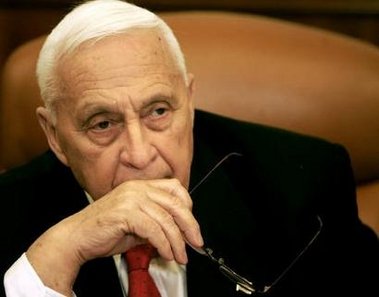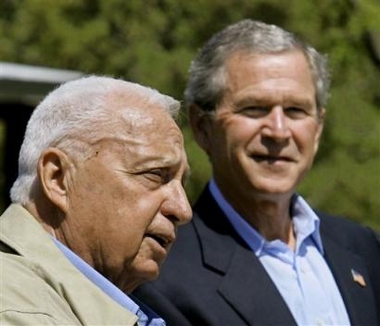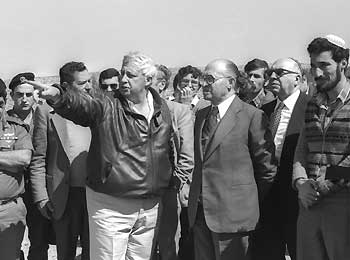|
Israeli PM Sharon in critical condition
(Reuters)
Updated: 2006-01-05 13:54 BUSH PRAYING
U.S. President George W. Bush, a close ally of Sharon, said "we are praying
for his recovery."
"Prime Minister Sharon is a man of courage and peace. On behalf of all
Americans, we send our best wishes and hopes to the prime minister and his
family," Bush added.
Sharon, who raised optimism for Middle East peace by pulling settlers and
soldiers out of the Gaza Strip last September to end 38 years of military rule,
suffered what doctors described as a mild stroke on December 18.
He had been due to undergo an operation on Thursday at Hadassah to repair a
tiny hole in his heart thought to have contributed to his stroke last month.

Israeli Prime Minister Ariel Sharon attends a
ceremony completing the sale of Bank Leumi to a private U.S. investment
group in his office in Jerusalem January 4, 2006.
[Reuters] | The hefty ex-general popularly known
as "The Bulldozer" spent several days in hospital but plowed back into a
punishing public schedule in recent weeks.
Opinion polls have shown Sharon was on course to win the March election as
leader of the new centrist Kadima faction he founded after quitting the
right-wing Likud party in the face of a party rebellion over the Gaza pullout.
He has campaigned on a platform of readiness to give up more occupied land in
the West Bank as a way to end decades of conflict, but has vowed to keep
Israel's hold on major settlement blocs.
BOLD STEPS
A large part of Sharon's popularity among Israelis stems from a belief that
he could take bold steps that others would not get away with given his
background as the archetypal hawk.
Palestinians have long suspected that Sharon's plans for ending conflict
meant that he would dictate terms that would leave them only fragments of the
state they seek.

U.S. President George W. Bush listens as
Israeli Prime Minister Ariel Sharon, left, reads a statement at a joint
news conference following their talks about the Middle East peace process
at Bush's ranch in Crawford, Texas, in this April 11, 2005 file
photo.[AP/file] | Deputy Palestinian Prime Minister Nabil Shaath said he did not believe Sharon
ever had any faith in the peace process, but his condition would increase
uncertainty over getting back to negotiations.
Battered by Sharon's harsh measures to fight a five-year-old uprising,
militant factions reacted with glee.
"The whole region will be better off with him absent," said powerful Islamic
group Hamas. "Sharon was the one who carried out massacres and terrorism for
decades against our people."

Israeli Prime Minister Menahem Begin (3rd R)
listens to Israeli Agriculture Minister Ariel Sharon (C) during a visit to
the West Bank settlement of Alon Moreh February 27, 1981 in this handout
photo released by the Government Press Office.
[Reuters] | In Washington, White House national
security adviser Stephen Hadley briefed Bush on Sharon's condition.
Bush has relied heavily on Sharon as he attempts to coax Israelis and
Palestinians into a peace agreement. He scolded Sharon after the prime
minister's stroke in December to watch what he eats and get more exercise.
Sharon's health crisis was likely to further slow Bush's quest for two
states, Palestine and Israel, living in peace.
Hopes for progress were already dwindling given the possibility of a delay to
a January 25 Palestinian election and growing internal unrest in the Gaza Strip
and West Bank as well as an increase in violence with Israel.
"I don't think we're going to have any efforts for a while," said Edward
Walker, president of the Middle East Institute and a former U.S. ambassador to
Israel.
"I don't see how you can marry up the Palestinians with the Israelis when
both are undergoing leadership crises."
Sharon's old foe Yasser Arafat, an iconic leader for the Palestinians, died
in November 2004 when a brain hemorrhage ended weeks of illness.
|